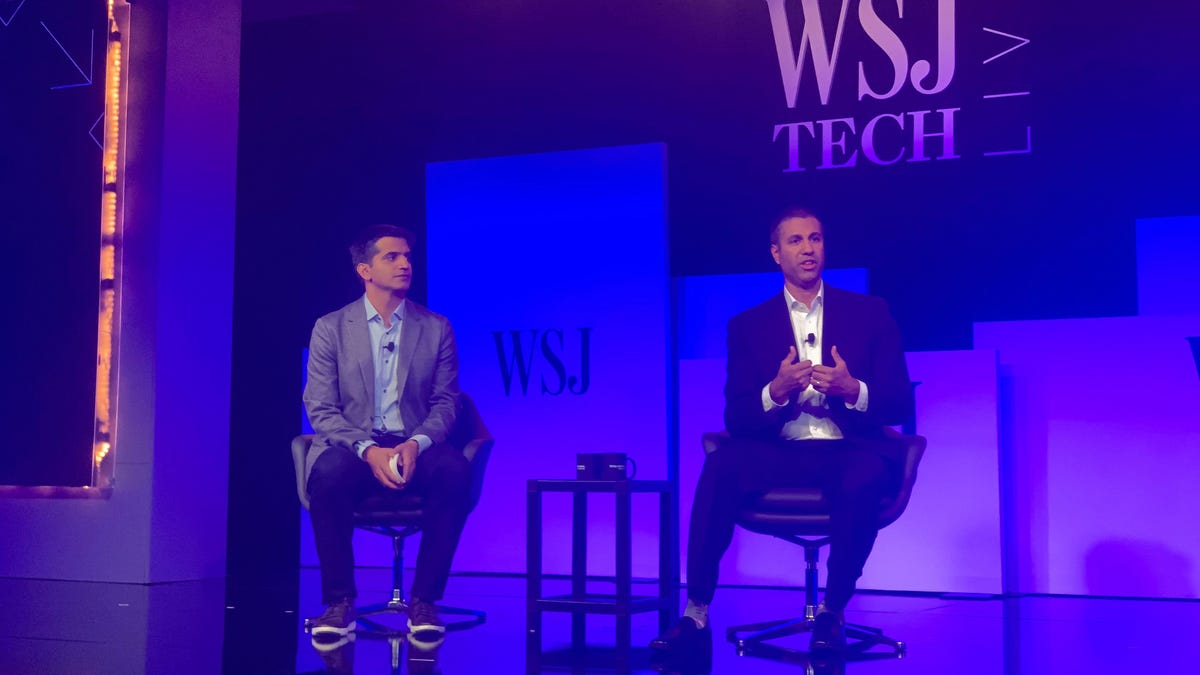FCC Chairman Ajit Pai argues a patchwork of state regs is bad for business
He says it's time for Congress to rethink federalism in the internet age.

FCC Chairman Ajit Pai at the WSJ Tech Live event in California talks about the importance of deregulation.
FCC Chairman Ajit Pai worries a patchwork of local and state regulations on internet technologies could hurt the competitiveness of the US in the tech sector.
Speaking at the WSJ Tech Live conference in Laguna Beach, California, on Monday, Pai made the case for harmonizing regulation among federal and state and local governments. He said that entrepreneurs and innovators not only need to consider the complexities of federal regulation, but they must also navigate regulations imposed by each of the 50 state governments, hundreds of local municipalities, as well as the more than 500 federally recognized native American tribes, which all want to take "a bite of the regulatory apple."
He argued that "while that federalist system has served us very well" up to this point in our nation's history, it's time for Congress to consider "whether or not we can still maintain a multilayer regulatory system." He said allowing states and local governments to pass their own laws regulating internet services, which inherently cross state lines, creates market uncertainty.
"When you're talking about the choice for a venture capitalist or an entrepreneur to set up shop in the United States where they have to get permission from the federal government or from the state of California, San Francisco, or some other jurisdiction, or whether they should set up shop in country B where there's a uniform, well-established set of regulations that are consistent, I worry that the proposition value for country B will become stronger over time."
It's no secret that Pai, who was appointed as chairman of the FCC by President Donald Trump, is no fan of regulation. Since taking the top post at the agency, he's been working at break-neck speed to remove as many regulatory hurdles as possible.
"One of the greatest impulses in Washington and government generally is to try to fit the square peg of where the marketplace is into the round hole of regulations and laws as they've always existed," Pai said. "That has a lot of unintended consequences, one of which is you implicitly discourage innovation, and secondly you might ultimately direct investment elsewhere where people might perceive that there is a greater ability to innovate and invest in other countries."
The idea that regulation stifled investment and innovation is what drove his efforts to rollback the popular Obama-era net neutrality rules, which prohibited broadband companies from slowing down or blocking access to internet sites and prevented companies from charging fees to deliver content faster. A key part of the FCC's repeal included a provision to preempt state laws that would reimpose these protections.
As Pai's agency has deregulated at the federal level, states have stepped in to fill the void with their own regulation. California has been at the forefront of this effort. After the FCC dismantled net neutrality, California passed even stricter protections.
California has also stepped in to help protect consumers' online privacy. Last year, the state legislature passed the California Consumer Privacy Act to give consumers more control over how companies collect and manage their personal data. This is something politicians in Washington, DC have talked about doing, but have yet to take action.
Meanwhile, the courts have begun weighing in on the question of federal preemption of state regulations, particularly when the federal government is not regulating in a particular area. Earlier this month, a federal appeals upheld most of the FCC's order to repeal net neutrality, but it struck down the provision that preempted states from passing their own regulations. This is good news for the more than three dozen states that have either passed or are looking to pass legislation to protect net neutrality and bar broadband companies from slowing down or blocking access to internet sites. And it may emboldened other states to pass their own legislation.
"The Commission's choice to give up oversight of broadband means that states now have the clear authority to step in to protect consumers and promote competition where the FCC is unwilling to do so," John Bergmayer, legal director for Public Knowledge, a public interest group involved in the challenge to the FCC's repeal of net neutrality, said following the ruling.
As for California's privacy law, states around the country are watching closely how the new rules will be implemented. But the big tech companies are turning their attention to Washington, DC.
The Internet Association, a lobbying group for several major tech companies including Facebook, Google, Amazon, Uber and Microsoft, has been calling on federal lawmakers to pass a privacy law that would apply across the nation. Their hope is to pass federal legislation that would preempt laws in California and other states to create a nationwide standard that they say would prevent a patchwork of state laws and regulations that they'd be required to comply with.
But privacy advocates warn that preempting state laws, such as California's CCPA, could provide less protection for consumers.

